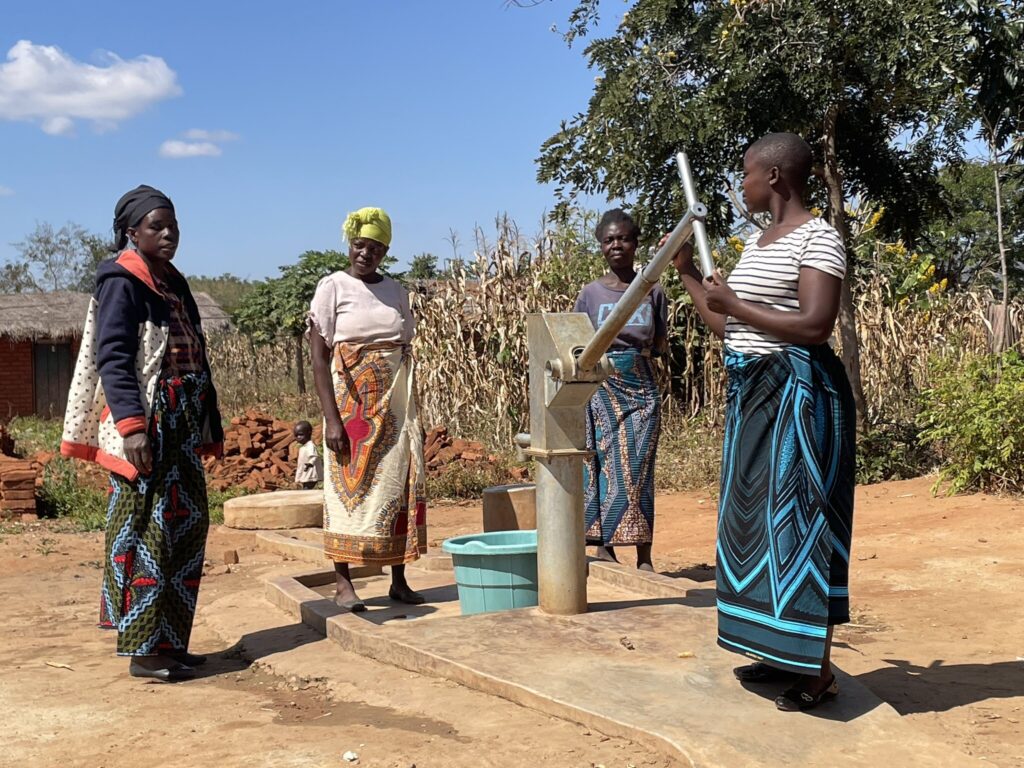Malome District, Nkhwe Village, Malawi … Traveling east along M-18, a two-lane road stretching between Kasungu and Nkhotakota, one gains a short reprieve from the unimaginable potholes, broken pavement, and construction jammed stretches of M-1 north of the capital. It is a grueling, heart-pounding,experience as cars suddenly serve to avoid the potholes and the giant lorries coming directly toward you on this stretch of road. Add the broken pavement and short stretches of construction and one wonders why there are not more road accidents than there are.
Shortly after leaving the Kasungu District, the four-wheel drive Isuzu enters the Malome District in north-central Malawi. After passing the busy trading area the vehicle makes a left turn onto a dirt road only slightly wider than the vehicle itself. A dust trail picks up a cadence in the soft earth behind the wheels.The entire trip from the capital was evidenced by the lack of water wells (boreholes) in nearby villages.People in this part of Malawi are forced to drink, cook, and wash from the same rivers as their livestockand other animals drive from. Contaminates are extremely problematic and frequent illnesses prevail because of contaminated water from rivers and streams. The people have little option. They simply suffer in silence.
Reaching the destination, the visitors are met by a committee of community leaders that over-see the operation of this well. It is the first of several wells (boreholes) planned for the area in coming months through the Malawi Project, Action for Progress, and several Rotary International chapters in central and northern Indiana. This well has been funded by the North Central Church of Christ, in Indianapolis, Indiana.
The meeting has brought together community leaders, tribal authorities and church representatives from the area. Nearby several children and women are busy drawing water from the completed well, known in Malawi as a borehole. In the distance one can see down a long hill toward a ravine that is well below the level on which the villagers are sitting. Before the well was completed the river below was the only placethe village women could reach water for their families.
In turn the tribal authority leaders, all women, step forward to express their gratitude for the borehole and all that it means to the three villages. Long walks down a steep hillside, dirty water that has contaminates from animals in and around the water, will no longer make them sick and add to their struggles in life, the women reported. Next came the chairman of the group. He noted that in his entire life they never have had a borehole for the area. Others had promised but only Action for Progress came and drilled for water. Next, the preacher added that in the book of Genesis, the Bible refers to the creation. It refers to four rivers placed in the Garden of Eden. He said this attests to the importance of water. The testimony of each of these people indicates the importance this water source is to the community.
Richard Stephens of the Malawi Project notes, “I left the site that day with a new appreciation for water. We take it for granted in much of the U. S. We just turn a tap and it is at our fingertips. Here, to get enough water to survive can be a desperate struggle every day. Even when you get the water, it can often be filled with contaminates that are going to make you sick. We are just so blessed in America and so few can comprehend how this part of the world lives.”

